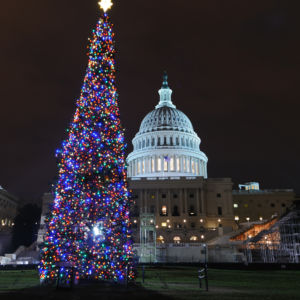Each year, as battlefield correspondents begin anew to report the “War on Christmas,” different eyes roll in different directions. Many agnostics, progressives, “indifferents,” and Christians skeptical of “those other Christians,” will tend to dismiss it and cast eyes heavenward. But should they? Is it all as easily dismissed as one would like?
If by “War on Christmas,” one merely thinks of spats over coffee cup designs and what greeting the store clerk uses, it might only be called a minor skirmish. Indeed, in the free market, businesses make decisions for a number of reasons, and they cannot always be accused of hostility to religion. True, it might be there, but corporate action may also be a response to a changing culture.
However, if referring to something much deeper, more insidious — something attacking the heart of what our society believes about truth and existence — then we can certainly speak of a “War on Christmas” and indeed, a war against God himself. This happens in two ways — one overt, and one more subtle.
First, religious language and the memorials often commemorating it are overtly removed from the public square. Religious monuments, public prayer and other mentions of God are chiseled away and removed from public view. Don’t think this is happening and has been happening consistently in our country for years? See Section I of “Hostility to Religion” on the Family Research Council website. Don’t think this matters? Well, continue reading.
Not too long ago, when then-leader Nikita Khrushchev wanted the Soviet Union to move past the era of Josef Stalin’s influence, he renamed buildings to avoid mention of the dictator, removed monuments of him, and changed the names of cities and other places bearing Stalin’s name. By avoiding public mention and reference to Stalin, Khrushchev could eventually erase him from the culture.
Symbols do matter, and communist and non-communist alike know it. That is why activists in the United States today war against religious monuments, public prayer and other government references to religion.
Second, in the War on Christmas, the notion of truth itself — and objective claims about Christ’s existence and authority over mankind — are marginalized and dismissed.
That is why activists war against the acceptability of orthodox, historic Christian beliefs — whether on the topic of sexuality or otherwise — being proclaimed in the public square of our nation today. Don’t believe this is happening? The last few years have seen scores of conflicts on this issue involving public officials, employees, businesses, non-profit organizations, religious universities and even churches.
One of these conflicts was featured in a case — Masterpiece Cakeshop v. Colorado Civil Rights Commission — that was just argued before the Supreme Court. During arguments, the justices clearly grappled not only with protecting the baker in the case from being forced to create a same-sex wedding cake against his conscience but with how to protect the religious freedom of some of the above-mentioned entities as they confront the requirements of same-sex marriage imposed by the same court just two years ago in Obergefell v. Hodges.
When religion is opposed during the culture war battles of the day, what is really being opposed is any claim to objective truth. This is why activists advancing same-sex marriage are not merely happy to receive marriage licenses; they must force others, whether public servants, religious schools, family business owners — and eventually pastors and churches — to assist in the effort and violate their religious beliefs in the process. Once truth claims are no longer tolerated in this area, they will no longer be tolerated in other areas — including the story of Christmas itself.
The War on Christmas is real, and it is best understood as a war on objective truth and the authority of God, which has historically anchored our country.
I can be as quick as the next person to say “spend more time sharing the Gospel with your neighbor than freaking out over whether the clerk said ‘Happy Holidays’ or ‘Merry Christmas.’” (Better yet, use that interchange to tactfully start a conversation about the life of Jesus, and share the Good News about Him.) But the truth of the matter is, they both matter — the need to reach out personally and share truth, and the symbols of our culture. Indeed, if the latter are no longer tolerated, neither will the former.
So yes, there is a “War on Christmas.” It’s as real as the person of Christ himself, and he assured us it would come. We should not be surprised that it has arrived.

